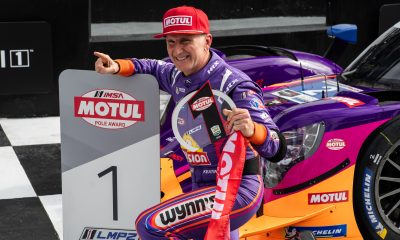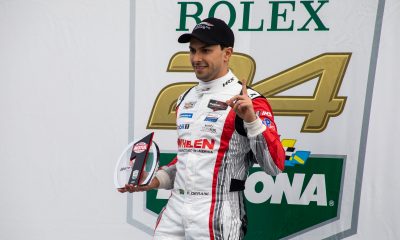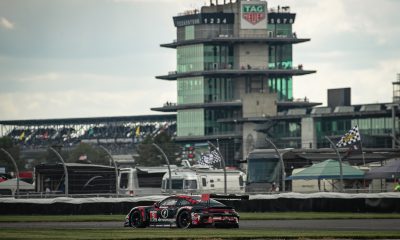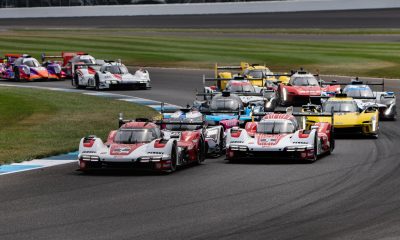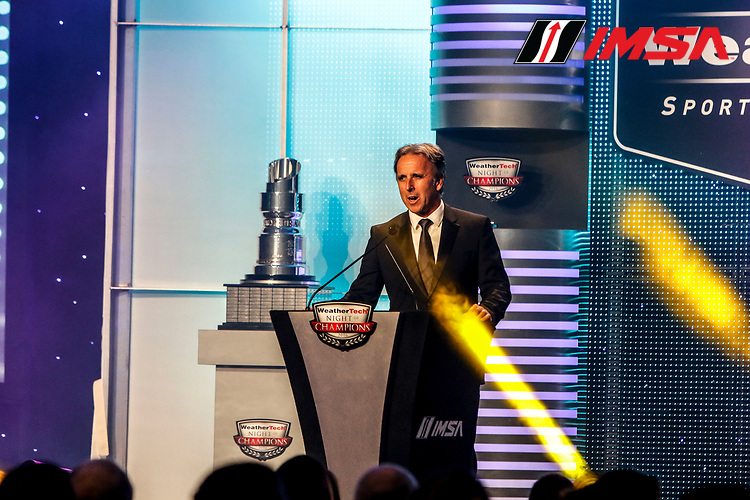
(Photo: Brian Cleary | LAT Photo USA)
During this edition of First Seasons, where The Podium Finish takes a look back on a motorsports driver’s rookie season, past or present, TPF catches up with former IMSA racecar driver turned NBC commentator Calvin Fish.
In this interview, Fish discusses how he made the move to the United States and how connections led him to a first ride with the Leon Brothers in IMSA, memories about driving for Roush Racing in 1990, winning the Rolex 24 at Daytona, the 12 hours of Sebring in ’90 as a co-driver with Robby Gordon and Lyn St. James, racing on a part-time schedule, what eventually led Fish to retiring as a driver, and making the transition to the broadcast booth where he is at these days.
Briar Starr: After competing in karts, Formula Ford, and British Formula Three, you would make the move to the United States and compete in what was then known as IMSA GT from 1985 through 1995 at the age of 24. Firstly, can you talk about what it was like moving to the United States and what was it about IMSA that you thought would be a great idea to compete in?
Calvin Fish: My goal was to compete in Formula 1 with me being based in Europe. I competed in Formula Three in 1983 off the back of a Formula Ford season, which was decent as I finished runner-up to Ayrton Senna in the Formula Ford 2000 championship.
At the time, he was just another Brazilian kid trying to make it into racing. As we all know, he turned out rather special. I got the BP ride, which was a fully funded Formula Three program in 1983. That year specifically, we didn’t have the best of the season and were left in the shadows of Senna and Martin Brundle. Both drivers had a historic battle for the championship and they moved on to Formula 1 in 1984.
Before the start of the ’84 season, I lost the BP ride as Johnny Dumfries got that deal. I was left out in the cold a little bit. The future looked bleak for a little while. Throughout my karting stuff, I met a Texan named Kim Campbell and he had a race shop in Dallas, Texas.
We were chatting and he was very good friends with my father, and they were discussing what the future was. He told me, ‘If you want to come to the States and have a crack at it, I’ll give you somewhere to live and see if you can network a little bit.’ That’s essentially what I did.
I told my mom in the time in April of 1984, that I was going to go over for a few months and eventually never come back. When I came to the States, I worked as a mechanic at Kim’s race shop with another full-time guy. We prepared anything SCCA-related along with Can-Am entry.
I kind of got buried in that deal because with only two of us being mechanics, it was hard to disappear. It did me good to take a break from the driving role, as it eventually refueled my passion for racing because, after the ’83 season, I was disenchanted with things. After a while, I missed driving and I was only age 23, so at the time, it wasn’t like I was washed up.
During the 1985 season, I did a local program running Formula Ford running the southeast division, and finished second in the ProSport 2000 championship. By being based not too far from Road Atlanta, I got to know the Leon Brothers (Al and Art) who had a race team nearby. Jack Ansley was the team manager and it was a cool little team. The Leon Brothers were super nice guys. That’s really where the initiation came in getting involved in IMSA.
They had a GTP team and they entered us into the Daytona 3-hour season finale race. The car broke in the race and this will sound crazy, but I’m not sure if I ever got in the race. The car broke before I ever got in.
Starr: I wanted to follow up about you moving to the United States. Was that a bit of a culture shock for you or not necessarily?
Fish: Well, I had been to the States before when I met Kim and we used to come over to race at the Daytona race and I came over for the first time in 1979 racing. Obviously, America is big and everything is fast-paced. It was a whole different scene, but appealing at the same time. Moving to the States was a fresh start for me and provided me with great opportunities.
Starr: Was racing in IMSA a dream come true for you at the age of 24? Did you feel ready to compete at that age?
Fish: I think most certainly. When I competed in Formula Three, the series was high-level. My background was up for it. To be honest with you, I never did a full season of IMSA. I essentially became a role player for the endurance races (Rolex 24 at Daytona and 12 hours of Sebring) for the manufacturers.
My goal was still to do single-seaters as an IndyCar. At the time, I did those starts in IMSA. I ended up going the Atlantic route due to the connections I had. Following the ’85 season, I did two years of Formula Atlantic winning the championship in 1987, and one season of Indy Lights in 1988 before making the move back to IMSA. I recognized sportscar racing over here was professional. I still had it in the back of my mind I wanted to do IndyCar.
Starr: In 1990, you got a big break with Roush Racing for the Rolex 24 at Daytona and 12 hours of Sebring. Can you discuss how you got the opportunity with Roush? Was it through the gong show that Roush held?
Fish: I was racing in the SCCA RaceTruck Challenge Series in 1989 and I also ran the Mustang, so there was a Ford connection there a little bit. I can’t remember how it went down, but I think it was mainly due to the Ford connection.
I did the gong show at Sebring at the end of the ’89 season. There was a host of guys. I had never driven a full proper Trans Am-style car before. There were like 10 drivers there. I was the second quickest on the test. At the end of the weekend, Lee Morse who was the Ford manager called me and said the test went well, and we’ll bring you up to Detroit.
There were two seats available at the time, Trans-Am or IMSA, and they were going to put me in one of them. I thought this was huge. Over the week, I had no phone calls from Lee. Eventually, I called up there, and they said there’s been a change of plan.
I forgot to mention another driver who was there at the time, which was Robby Gordon. Robby was close with one of the big bosses at Ford. I guess, he kept calling all week and I ultimately said to the manager, you’re going to put Robby in one of these seats. And that’s somewhat how I got the endurance ride only.
Starr: I want to briefly follow up on your first Daytona experience as a whole. What was it like being there for the first time?
Fish: My first time at Daytona was when I ran the karts there in 1979. When I drove the tunnel for the first time, Daytona left a huge impression on me since I had never seen anything like it in the U.K.
Starr: You were a co-driver with Robby and Lyn St. James at both of the races at Daytona and Sebring. How special was it winning those races as a co-driver and did the victory ever sink in for you during that era?
Fish: I think it did. The win felt very special and to do it with Jack was cool.
I’ll tell you a funny story. Jack wasn’t around for the testing, but he was always there first thing in the morning come race weekend. He never came up and had a conversation with me up to that point. Other than a brief team meeting, I didn’t have a voice recognition with him. I remember leading the race by a few laps during the middle of the night and he came on the radio to tell me, ‘Hey Cal, this is Jack. Slow the hell down, we have a big lead.’
I drove around for two laps trying to figure out the voice and it dawned on me that it was Jack. It was a hard race that year in 1990, it was very hot and humid. I remember during the first 15 minutes of my stint, my arm began falling asleep because we ran this funky steep since we didn’t have an individual regular seat. We had this seat back that was round like a curvature to fit a smaller body and a slightly bigger one for a bigger person to fit in. My back upper shoulders were right in between the two. I had this little point and it was hitting me in the nerve and I had to run the rest of the race with a seat belt loose. I couldn’t feel the gear shift, but that’s the consequence of you live and learn for the years to come to make yourself comfortable in the car.
It felt big to win it and being there in victory lane with a big team was massive. Back in the time, it was typically which one of Jack’s cars was going to win. We had four to six cars running and they were just built like tanks. The cool thing I remember is Jack’s cars had such a distinctive sound, I remember being in the motorhome, you could wake up and hear the car running. You knew you were still in the race.
Starr: After the ’90 season, you began driving for various teams on a part-time schedule through the end of your career. Talk about what brought you back to a part-time basis?
Fish: I raced with a Canadian kid named David Tennyson and the team was run by an Italian during the ’90 season after the Roush deal. That opportunity didn’t pan out like I had hoped and each year, I would get invited back to different teams. It went down the road where if I didn’t get a full-time ride, I was scratching to earn a living. Not great times to be honest with you. I was pretty much done and dusted.
Starr: With that being said, what led to retirement? Was that your decision or a forced decision? Did it take a while to get used to not racing while being in the broadcast booth?
Fish: There was no one day I said I was going to retire. The opportunities became less and less. It wasn’t a conscious decision. I went through the ringer a bit in the U.K. back in ’83 at the end of the year when my career stalled out. The credentials were there, but the opportunities never came about.
I didn’t start looking at television until one day at Canadian Tire Motorsports Park coaching someone, I bumped into Derek Daly right when Speedvision was just being established. A guy who became pivotal was Jeff Hallas. He asked me if I had done a little bit of television and do you have an interest in doing it?
I was at a point in life where I kind of needed something. So, I called him up and we did half a dozen races to fill out the rest of the year. I started with the 6 Hours of Watkins Glen and ended up being on the broadcast side ever since then. That day at CTMP was a game-changer for me. I was just in survival mode looking for something to do.
Starr: Going in a different direction here to close out the interview. Favorite trophy in your collection or one that means the most to you?
Fish: My first proper win in cars was in early 1981 at Silverstone. That win was significant in my career. Winning at Daytona was cool as well. Unfortunately, at the time, you didn’t get the Daytona watch like you do nowadays. The win at Silverstone stands out the most though.
Starr: Some racers have a memorabilia collection and some don’t. Are you a driver that collects your own merchandise and if so, what in your collection reminds you about your rookie season(s)?
Fish: Looking back, I wished I had kept more of my stuff. Back then, I gave my helmets away as mementos for other people. Fortunately, my dad kept a lot of trophies back then and they sit in my office today. I wished I had kept more of my gear. I was focused on looking ahead.
Starr: What is one memory that you will always remember or something that will stick out to you regarding your rookie season?
Fish: If you are determined and disciplined, you can be successful at whatever level you compete at. I think if I look back at some of the guys I competed against, they had a little more natural ability than me, but if you dedicate yourself to learning to maximize your performance, you can compete as long as you’re willing to keep trying.
Starr: Wrapping this interview up – it’s hard to believe your first start came well over 43 years ago. However, if time travel was available, what would a 62-year-old Calvin Fish tell an 18-year-old Calvin Fish? Is there anything you would do differently?
Fish: I don’t know if I would do anything differently, but I wished I had some attributes I had today in terms of people management skills and confidence. I think there are things that I learned I wished I would do differently in how I handled different scenarios. If the opportunities had come my way later on in life, I probably would’ve been more successful.

